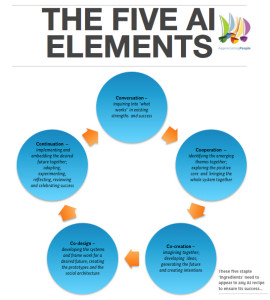Community life competence
Connecting local responses around the world
Connect with us
Website: the-constellation.org
Newsletter English, French Spanish
Facebook https://www.facebook.com/pages/The-Constellation/457271687691239
Twitter @TheConstellati1
Instagram: https://www.instagram.com/constellationclcp/
Appreciative Inquiry the 5C framework
Over the last year we’ve delivered AI workshops with a huge range of clients and collaborators, from schools to churches, health and charities. From this experience, we realised that five key components were required for an Appreciative InquiryINTERVENTION to have maximum impact. Five ‘vital elements’ of the appreciative process need to flourish to support the use of the key AI tools (the appreciative conversation, the 5D process and SOAR).You can download a copy of the Five AI Elements from our resources ....
to have maximum impact. Five ‘vital elements’ of the appreciative process need to flourish to support the use of the key AI tools (the appreciative conversation, the 5D process and SOAR).You can download a copy of the Five AI Elements from our resources ....
These ‘vital elements’ are: conversations, cooperation, co-creation, co-design and continuation. Without these elements, the AI process doesn’t have life and vitality, and struggles to become generative. A useful way to understand these elements is to see the AI tools as a set of recipes, and the five elements as the staple ingredients – you can add other ingredients, but without these ‘staples’, the recipe won’tWORK . The AI experience can be fleeting and just a positive experience. Sustained application of the 5C elements continues generativity. Its promotion within recent AI training programmes has also helped Appreciative Inquiry understanding.
. The AI experience can be fleeting and just a positive experience. Sustained application of the 5C elements continues generativity. Its promotion within recent AI training programmes has also helped Appreciative Inquiry understanding.
“I like it. It gives me food for thought for my conversation with a hospital that has asked for me to facilitate an AIINTERVENTION ”
”
Anita Sheehan, Impakt Coaching
We’ve tested this concept recently in a number of workshops and with a small number of AI practitioner colleagues, and response from both participants and practitioners has been very positive. The diagram above summarises the essence of each of the five.
Conversation: This relates to the importance and value of paired and/or group conversations. These use generative questions to foster dialogue, establish a ‘trust field’, build on the foundations of shared and existing strengths, and explore times of peak performance and success. Such conversations create the space for change, identify possible opportunities, and lay the foundations for collaboration and creativity.
Cooperation: This recognises the importance ofWORKING together throughout the AI process, using the whole system to create a commonFUTURE
together throughout the AI process, using the whole system to create a commonFUTURE path. It means ensuring all voices and ideas are heard and that the vision for the future is ‘owned by all’. Cooperation lays the foundations for co-production – a vital element, especially of the design and destiny stages.
path. It means ensuring all voices and ideas are heard and that the vision for the future is ‘owned by all’. Cooperation lays the foundations for co-production – a vital element, especially of the design and destiny stages.
Co-creation: This refers to collectively identifying the future vision,SHARING ideas, and using imagination to develop the future intentions, and provocative propositions or future frameworks.
ideas, and using imagination to develop the future intentions, and provocative propositions or future frameworks.
Co-design: This is about encouraging prototyping, co-production and ‘design thinking’, based on the intentions that emerged from the Dream stage. It engages everyone in creating the arrangements for Delivery and Destiny stages.
Continuation: This recognises that it’s an ongoing process of building on the intentions, supporting the actions and frameworks developed, trusting the system, encouraging reflective learning and evaluation and supporting flexibility and agility. Continuation includes embedding these five vital elements as the future norm. It also includescelebrating the successes.
“It’s a really useful checklist and helpful reminder”
AI training course participant
The Five AI Elements concept has been co-designed and co-created with our international partners Inspiring Partners (Spain), Impakt coaching (Belgium) andACTIVE Change (Italy). We’re happy for you toSHARE
Change (Italy). We’re happy for you toSHARE and develop these ideas…
and develop these ideas…
Comment
-
Comment by Tim Slack on August 5, 2015 at 2:16pm
-
All elements are present at all stages. They are inter dependant and inter related. By using paired conversations, group sharing of stories and encouraging co-creation and co- design together encourages "all voices to be heard". In a recent inter generational AI workshop generative questions and sharing together ensured everyone could take part
Am in process of writing a longer article about these elements which will spell it out more
-
Comment by Rituu B. Nanda on August 3, 2015 at 6:43pm
-
Hi Tim, thanks for sharing. I have a question for the component of cooperation. I work in communities which are heterogeneous and complex for instance the issues of the elder female sibling would be different from those of younger female sibling. How do you ensure that no one's voice is missing? how do you ensure that those who are most vulnerable their voice is heard? What is your experience?
© 2026 Created by Rituu B. Nanda.
Powered by
![]()

You need to be a member of Community life competence to add comments!
Join Community life competence